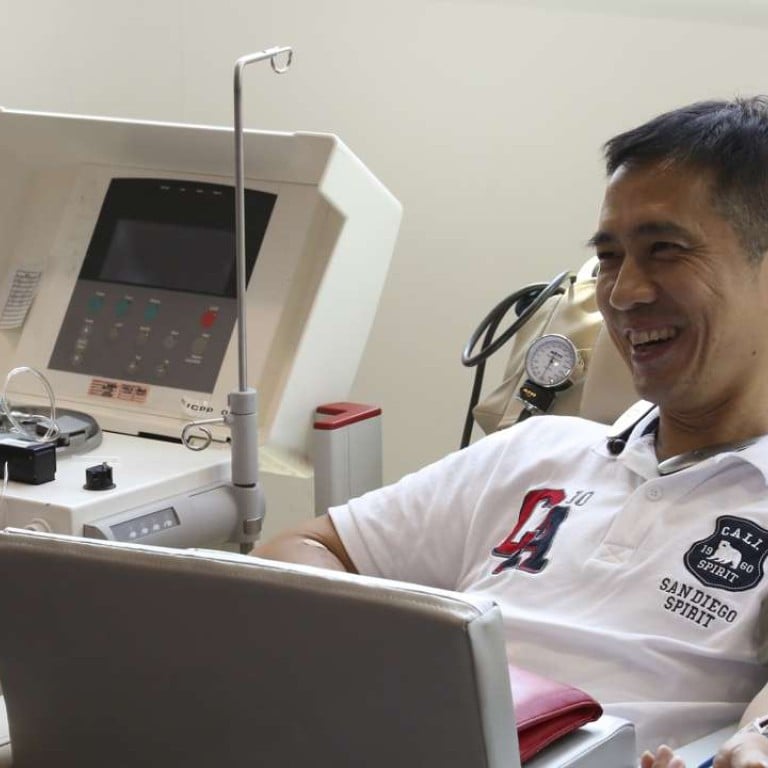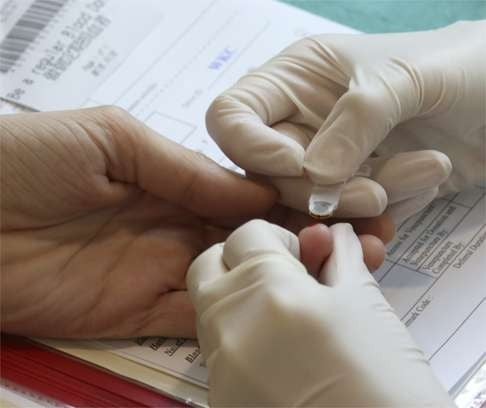
Hong Kong needs your blood (unless you lived in Europe in the 1980s and ’90s)
About 1,100 blood donors a day are needed to keep hospital stocks up, but the city only gets 800-900. Kylie Knott heads to the donor clinic to talk to some local heroes and find out who can and can’t give blood
Stretched out on a bed, Eric Yuen Yiu-ming quietly taps away at his laptop. He looks happy and relaxed considering he’s surrounded by monitors and has a tube in his arm that’s hooked to a machine.
Yuen, 45, is donating blood – and not the first time. He’s given 78 times, starting when he was 16, and plans to donate for as long as he can (the maximum age of donation is 70 years; first time blood donors have to be between 16 and 60 years old).
Watch: How blood donation saves a Hongkonger's family
Donating blood is an important duty, Yuen says, but his reasoning is also personal. Twelve years ago his wife needed nine bags of blood – about three litres – due to emergency surgery following the premature birth of their son.
“Without those transfusions my wife would have died. So if there are no donors, where are people who need blood going to get it from?” the father-of-two says.
On a bed next to Yuen is fellow donor Eddy Kung Chi-ho. He’s donating for the 111th time and says he followed in his father’s footsteps.
“My father donated so for me it was a natural progression,” says the 32-year-old. “I also know that when I donate blood I am saving lives, so for me that is enough motivation.”
It’s a Friday afternoon and the sixth floor of the Red Cross’ shiny new West Kowloon Donor Centre is almost full with people giving blood – one donation can save three or more lives. The silence is broken only by the almost hypnotic hum of the machines.
Red Cross’ recruitment and publicity manager Henry Man says “today is a good day with many donors” but he warns inventories are at alarmingly low levels and hopes World Blood Donor Day on June 14, with this year’s motto “Blood connects us all”, will help raise awareness.

Blood products are needed to treat patients who have surgery because of illness or accident. It’s also used by people with chronic diseases. Hongkonger Grace suffers from thalassemia, a genetic blood disorder whereby she can’t produce enough haemoglobin and requires three bags of blood every four weeks.
“There are many people like me who need blood to sustain their lives so I am so grateful to those who donate,” Grace says.
But not everyone can donate. People who display flu symptoms are ruled out, while about 10 per cent of new blood donors are unfit to donate due to a lack of haemoglobin – a protein in red blood cells that carries oxygen throughout the body – caused by poor eating and living habits. Low blood pressure is another reason and SCMP photographer Nora Tam, who shot the photos for this story, was refused “because my veins are not prominent enough.”
Also at the centre is Cecilie Larsen. A regular blood donor in her home country Denmark, Larsen wanted to do her civic duty and donate in her adopted Hong Kong. However she was shocked to hear she was unable to give blood because of fears of Variant Creutzfeldt-Jakob disease (vCJD), the human form of mad cow disease.

According to the Hong Kong Red Cross donor selection guidelines, anyone who spent three or more months in Britain from 1980 to 1996, or five or more years in Europe from 1980 to the present, are unable to donate blood in Hong Kong due to fears of transmitting vCJD. This rule is based on evidence from a small number of case reports involving patients and laboratory animal studies that vCJD can be transmitted through transfusion.
Similar measures apply in other countries including the US, Australia, New Zealand, Japan and Singapore.

The first case in 2001 involved a 34-year-old woman who lived in Britain during the 1980s and 1990s. She died in 2002.
A 23-year-old British man who came to Hong Kong in 2006 was diagnosed that year. According to the latest information, he is now living in Britain.
Early symptoms of vCJD include memory loss, unsteady gait and loss of coordination of limbs, according to the Department of Health. These dementia-like symptoms will worsen and twitching of limbs and trunk also occur. Besides, visual disturbance, abnormal behaviours and seizures can occur. Most patients die within one to two years after onset of symptoms.
The World Health Organisation says there are no reliable tests to use before the onset of clinical symptoms of vCJD. Currently diagnosis can only be confirmed following pathological examination of the brain post mortem.
Says Larsen: “I definitely think there needs to be a rethink on the rules governing blood donation as they are way too strict at the moment.”
A British man who wanted to donate blood at a Red Cross blood-donation drive in his office earlier this year was also surprised when told he could not because of fears over vCJD.
“Cases are very rare judging from my own research, and symptoms generally prove fatal within 12 months. If I had caught this disease before 1996 I’d either be a) long dead or b) a medical miracle. I’m neither,” says the Briton, who spoke on condition of anonymity.
“It sounds crazy and outdated considering both the government and Red Cross are trying to encourage blood donations. I’m not sure how many people in Hong Kong are excluded, but I’m sure it’s a significant part of the city’s population.”
The Red Cross says its donor selection criteria is under regular review by the Hospital Authority and undergoes revision based on the latest scientific and epidemiological evidence.
For more details on blood donation visit 5.ha.org.hk/rcbts

